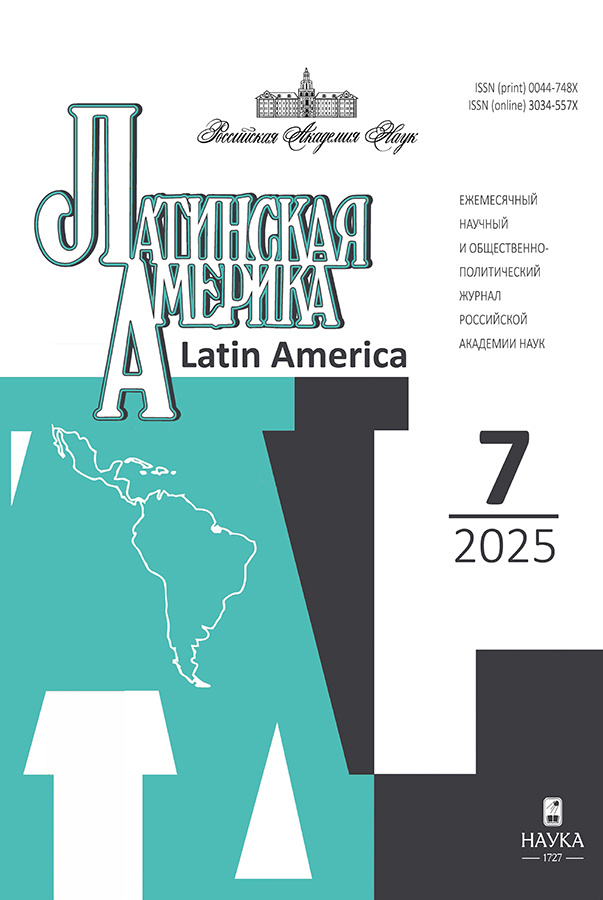Features of digital diplomacy in Latin American countries during an era of global turbulence
- 作者: Vinogradova E.A1
-
隶属关系:
- Research Center of Artificial Intelligence Technologies in International Relations (RC AITIR)
- 期: 编号 7 (2025)
- 页面: 80-94
- 栏目: The society of 21st century
- URL: https://bulletin.ssaa.ru/0044-748X/article/view/686727
- DOI: https://doi.org/10.31857/S0044748X25070061
- ID: 686727
如何引用文章
详细
In recent years, the public diplomacy of Latin American countries has undergone significant transformation, driven by the utilization of digital technologies as instruments of soft power. Digital diplomacy involves the use of social media, virtual meetings, and online platforms to promote national interests. Over the past fifteen years, the presidents of Latin America have actively employed this tool of public diplomacy to connect with target audiences across the globe. In most Latin American countries, Twitter diplomacy is being promoted to enhance the effectiveness of public diplomacy and engage citizens through the publication of tweets by political figures or agencies aimed at disseminating information about their foreign policy. This approach not only informs the international community but also facilitates interaction with citizens, thereby increasing transparency and accountability of the authorities. However, the lack of artificial intelligence (AI) technologies, such as chatbots and digital consultants, within the diplomatic agencies of Latin American countries, along with the unauthorized use of generative artificial intelligence technologies in information-psychological operations within the region, hinders the development of effective diplomacy.
作者简介
E. Vinogradova
Research Center of Artificial Intelligence Technologies in International Relations (RC AITIR)
Email: vinogradovacatherine7@gmail.com
Cand. Sci. (Political Science), Director General Moscow, Russian Federation
参考
- OECD/CAF Digital Government Review of Latin America and the Caribbean: Building Inclusive and Responsive Public Services. OECD Digital Government Studies. OECD Publishing, 8.09.2023, 233p. (DOI: https://doi.org/10.1787/29f32e64-en.P.14).
- “Cifra” i iskusstvennyj intellekt na sluzhbe diplomatii: analiticheskiy doklad. Otv. red. Ye.S. Zinov'yeva. [«Digit» and artificial intelligence in the service of diplomacy: analytical report]. Moscow, MGIMO, 2024, 68 p. (In Russ.).
- Zinov'yeva Ye. S. Tsifrovaya diplomatiya SShA: vozmozhnosti i ugrozy dlya mezhdunarodnoy bezopasnosti. [Digital Diplomacy of the United States: Opportunities and Threats to International Security]. Indeks Bezopasnosti, Moscow, 2013, N 1 (104), vol. 19, pp. 213-228 (In Russ.)
- Bjola C. Social Media and Public Diplomacy: A Comparative Analysis of the Digital Diplomatic Strategies of the EU, U.S. and Japan in China. Digital Diplomacy: Theory and Practice. Oxford, 2015, 31 p.
- Rodríguez A. Diplomacia digital, ¿adaptación al mundo digital o nuevo modelo de diplomacia? Revista de Ciencias Humanas y Sociales. Cali, 2015, N 31(2), pp. 915-937.
- Knaysl' K. Rekviyem po Yevrope. Per. s nem. Ye. Krepak, A. Novitskoy, red. A. Ponomarenko [Requiem for Europe]. Moscow, Politicheskoye obozreniye, 2024, 216 p. (In Russ.)
- Sinchuk Yu. V., Vlasov B. Ye., Ogurtsov A. Ye. Tsifrovaya diplomatiya kak instrument vneshney politiki. [Digital Diplomacy as a Tool of Foreign Policy]. Vestnik Moskovskogo gosudarstvennogo lingvisticheskogo universiteta. Obshchestvennyye nauki. Moscow, 2022, N 4, vol. 849, pp. 52-61. (In Russ.). doi: 10.52070/2500-347X_2022_4_849_52
- Tsvetkova N.A., Sytnik A.N., Grishanina T.A. Tsifrovaya diplomatiya i digital international relations: vyzovy i novyye vozmozhnosti. [Digital diplomacy and digital international relations: Challenges and new advantages]. Vestnik Sankt-Peterburgskogo universiteta. Mezhdunarodnyye otnosheniya. St. Petersburg, 2022, vol. 15, iss. 2, pp. 174-196. (In Russ.). DOI: https://doi.org/10.21638/spbu06.2022.204
- Azeez I. A. A. The Influence of Digital Diplomacy on Foreign Policy. Journal of Tourism Economics and Policy, London, 2023, N 3, vol. 3, pp. 189-203. DOI: https://doi.org/10.38142/jtep.v3i3.770
- Rodríguez Vega D. El entorno digital del diplomático 4.0: propuesta para un marco de trabajo. Revista Política Internacional, Lima, 2023, pp. 61–78. doi: 10.61249/pi.vi130.28
- Bjola C., Manor I. Cassidy J. Public Diplomacy in the Digital Age. The Hague Journal of Diplomacy, Oxford, 2019, N 14 (1-2), pp. 83-101. doi: 10.1163/1871191X-14011032
- Aguirre Azócar D., Erlandsen M. La diplomacia pública digital en América Latina: desafíos y oportunidades. Revista Mexicana de Política Exterior, México, 2018, N 113, pp. 1-18. doi: 10.1093/acrefore/9780190846626.013.149
- Guadarrama Sánchez H. A. La diplomacia digital en Twitter: el caso de México y Estados Unidos. Investigaciones Bibliotecológicas, México, 2022, N 92, vol. 36, pp. 33-57. DOI: https://doi.org/10.22201/iibi.24488321xe.2022.92.58572
- Benayas G. La diplomacia pública digital en México y Chile. Desafíos, Bogotá, 2021, N 33, vol. 1, pp. 1-33. doi: 10.12804/revistas.urosario.edu.co/desafios/a.8345
- Deciancio M. Digital Diplomacy in Argentina’s Foreign Policy. 2023. Available at: https://pure.giga-hamburg.de/ws/files/51764136/GIGA_DigitalDiplomacyStatecraft_PB_02-2024_Deciancio.pdf (accessed 20.03.2024).
- Góes K. E. A Diplomacia digital e seu uso pelo Ministério das Relações Exteriores do Brasil. Available at: https://www.encontro2017.abri.org.br/resources/anais/8/1498489143_ARQUIVO_ArtigoABRI2017-DiplomaciaDigital-EduardoKraemerGoes.pdf (accessed 3.04.2024).
- Vinogradova E.A. Rol' publichnoy diplomatii ALBA v uregulirovanii siriyskogo konflikta. [The Role of ALBA Public Diplomacy in the Settlement of the Syrian Conflict]. Mirovaya politika. Moscow, 2015, N 1, pp. 55-65 (In Russ.). doi: 10.7256/2306-4226.2015.1.12619
- Declaración de la Cumbre UE-CELAC de 2023 – EEAS.P.4. Available at: https://www.consilium.europa.eu/media/65925/st12000-es23.pdf (accessed 16.03.2024).
- AI and Diplomacy: International relations in the age of disruptive technologies. Latin American and Caribbean Economic System (SELA). Editorial Director: Clarems Endara. La Paz, Bolivia, 124 p.
- Sytnik A.N., Bazulutskaya M.M. Analiz sotsial'nykh setey kak chast' issledovaniya tsifrovoy diplomatii: ot ruchnoy obrabotki dannykh k II-analitike. [Analysis of social networks as part of the study of digital diplomacy: from manual data processing to AI analytics]. St. Petersburg, Skifiya-print, 2024, 32 p. (In Russ.).
- Digital platforms: competition aspects and regulatory recommendation for Brazil. The report. Secretariat of Economic Reforms Ministry of Finance, 2024, 99 p.
- Brazilian Digital Transformation Strategy (E-Digital). 2022-2026 Cycle, Brasília, 2022, 98 p.
- González I., Rodríguez A. Diplomacia digital en la alianza del pacífico: una aproximación a Twitter como herramienta para la política exterior. Revista de Estudiantes de Ciencia Política. Medellín, 2020, N 16, pp. 63-89.
- Romero L. Proceso de digitalización del servicio exterior, de México y España: Retos y oportunidades. Documentación de Ciencias de la Información. Madrid, 2018, N 41, pp. 163-182. DOI: https://doi.org/10.5209/DCIN.61407
补充文件








